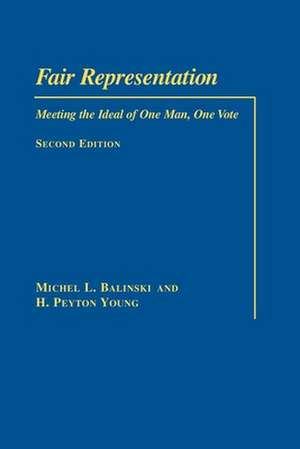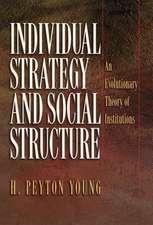Fair Representation: Meeting the Ideal of One Man, One Vote
Autor Michel L. Balinski, H. Peyton Youngen Limba Engleză Paperback – sep 2001
The issue of fair representation will take center stage as U.S. congressional districts are reapportioned based on the 2000 Census. Using U.S. history as a guide, the authors develop a theory of fair representation that establishes various principles for translating state populations—or vote totals of parties—into a fair allocation of congressional seats. They conclude that the current apportionment formula cheats the larger states in favor of the smaller, contrary to the intentions of the founding fathers and compromising the Supreme Court's "one man, one vote" rulings. Balinski and Young interweave the theoretical development with a rich historical account of controversies over representation, and show how many of these principles grew out of political contests in the course of United States history. The result is a work that is at once history, politics, and popular science. The book—updated with data from the 1980 and 1990 Census counts—vividly demonstrates that apportionment deals with the very substance of political power.
Preț: 212.50 lei
Nou
Puncte Express: 319
Preț estimativ în valută:
40.67€ • 42.30$ • 34.08£
40.67€ • 42.30$ • 34.08£
Carte tipărită la comandă
Livrare economică 13-27 martie
Preluare comenzi: 021 569.72.76
Specificații
ISBN-13: 9780815701118
ISBN-10: 081570111X
Pagini: 192
Ilustrații: 1
Dimensiuni: 152 x 229 x 13 mm
Greutate: 0.31 kg
Ediția:Second Edition
Editura: Brookings Institution Press
Colecția Brookings Institution Press
ISBN-10: 081570111X
Pagini: 192
Ilustrații: 1
Dimensiuni: 152 x 229 x 13 mm
Greutate: 0.31 kg
Ediția:Second Edition
Editura: Brookings Institution Press
Colecția Brookings Institution Press
Notă biografică
Michel L. Balinski is the former director of the Laboratoire d'Econométrie of the Ecole Polytechnique in Paris, the founding editor of the journal Mathematical Programming. and is a noted authority on mathematical optimization and operations research. H. Peyton Young is a senior fellow in the Economic Studies program at the Brookings Institution and Scott and Barbara Black professor of economics at Johns Hopkins University. He is the author of several books, including Individual Strategy and Social Structure (Princeton, 1998) and Equity in Theory and Practice (Princeton, 1994).
Descriere
The issue of fair representation will take center stage as U.S. congressional districts are reapportioned based on the 2000 Census. Using U.S. history as a guide, the authors develop a theory of fair representation that establishes various principles for translating state populations—or vote totals of parties—into a fair allocation of congressional seats. They conclude that the current apportionment formula cheats the larger states in favor of the smaller, contrary to the intentions of the founding fathers and compromising the Supreme Court's "one man, one vote" rulings. Balinski and Young interweave the theoretical development with a rich historical account of controversies over representation, and show how many of these principles grew out of political contests in the course of United States history. The result is a work that is at once history, politics, and popular science. The book—updated with data from the 1980 and 1990 Census counts—vividly demonstrates that apportionment deals with the very substance of political power.

















